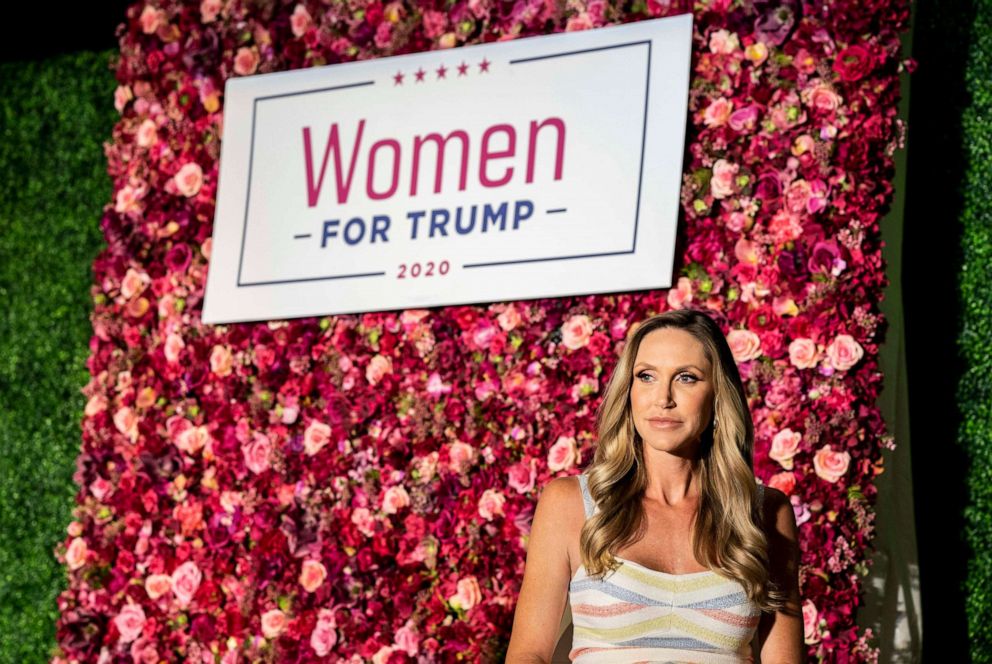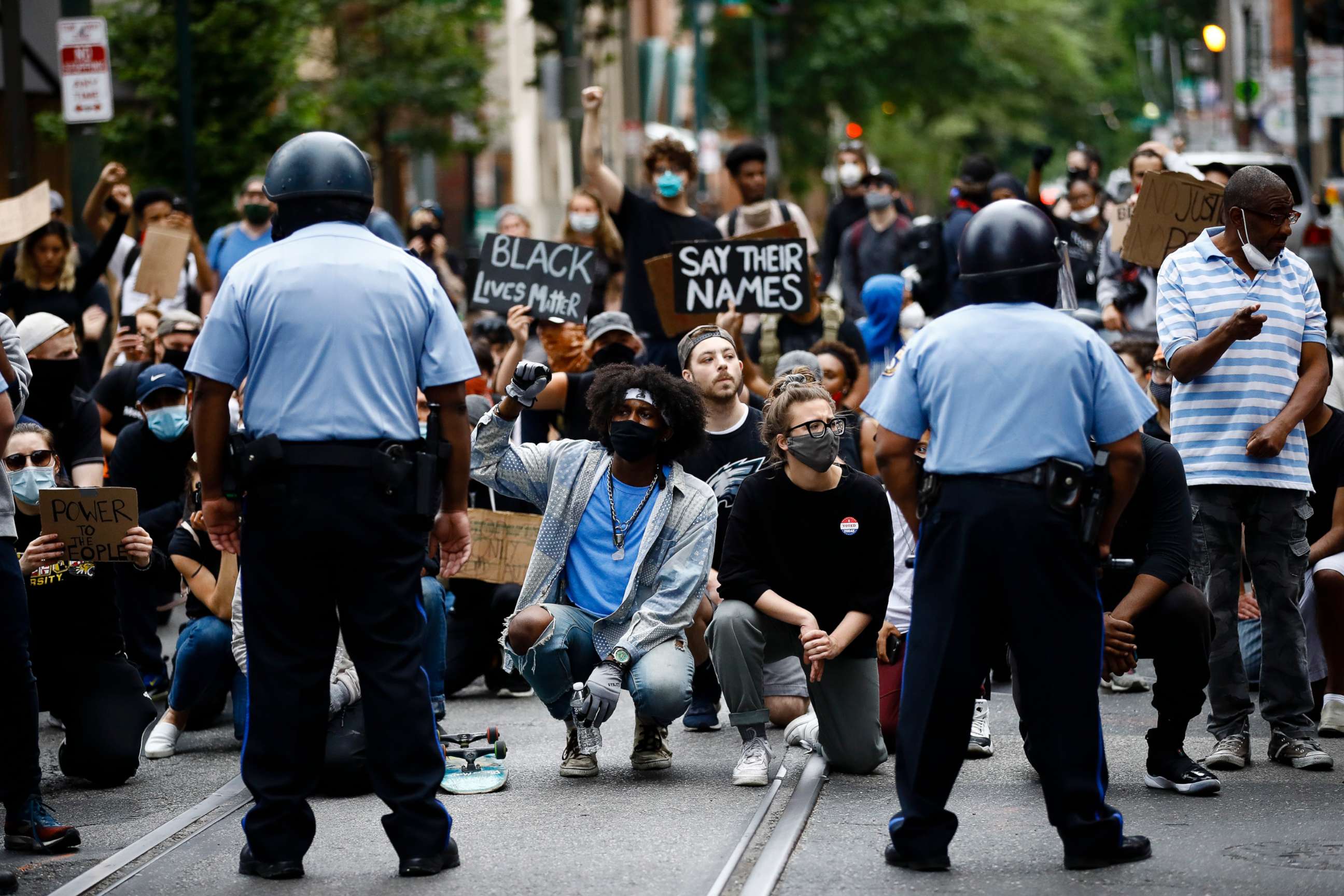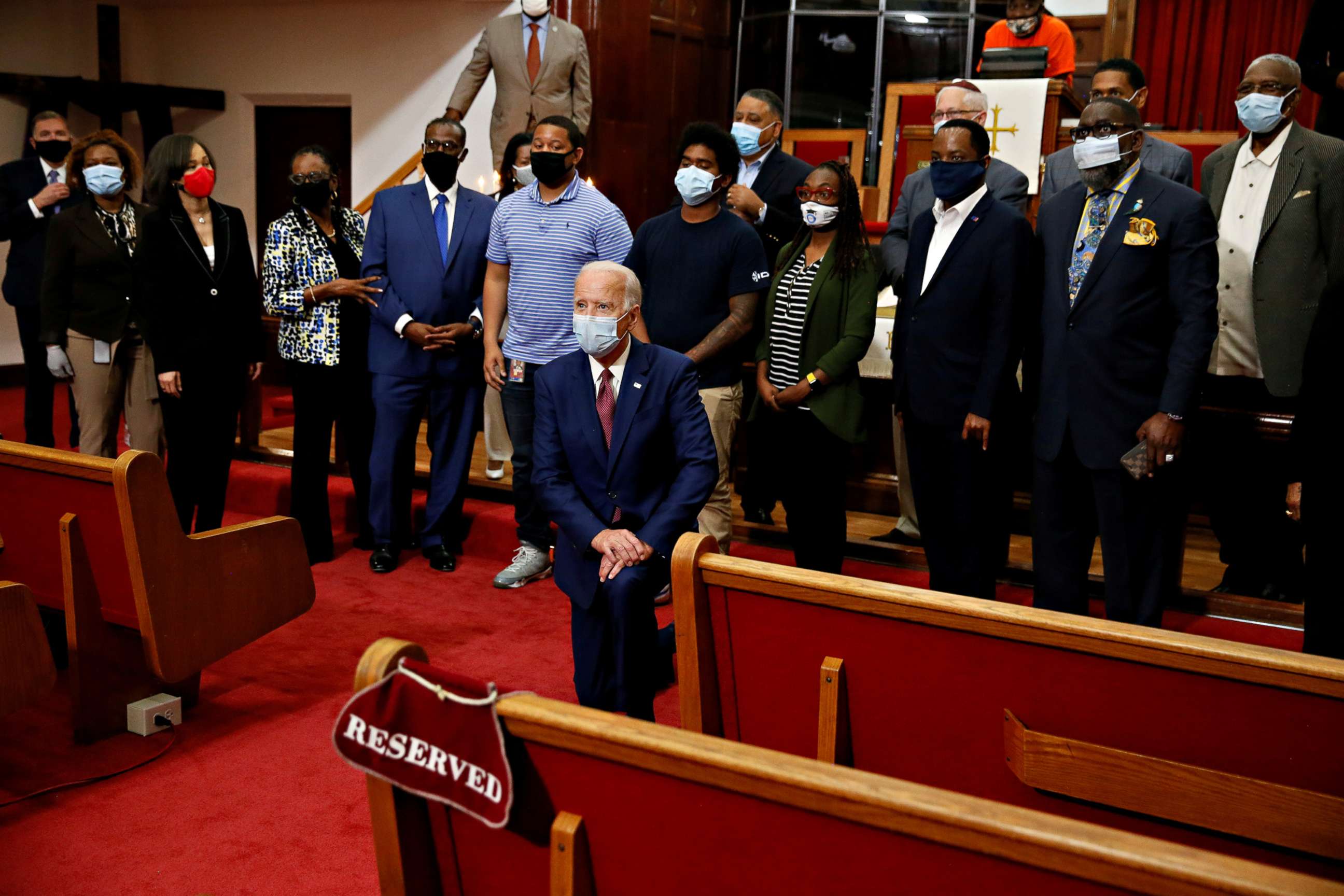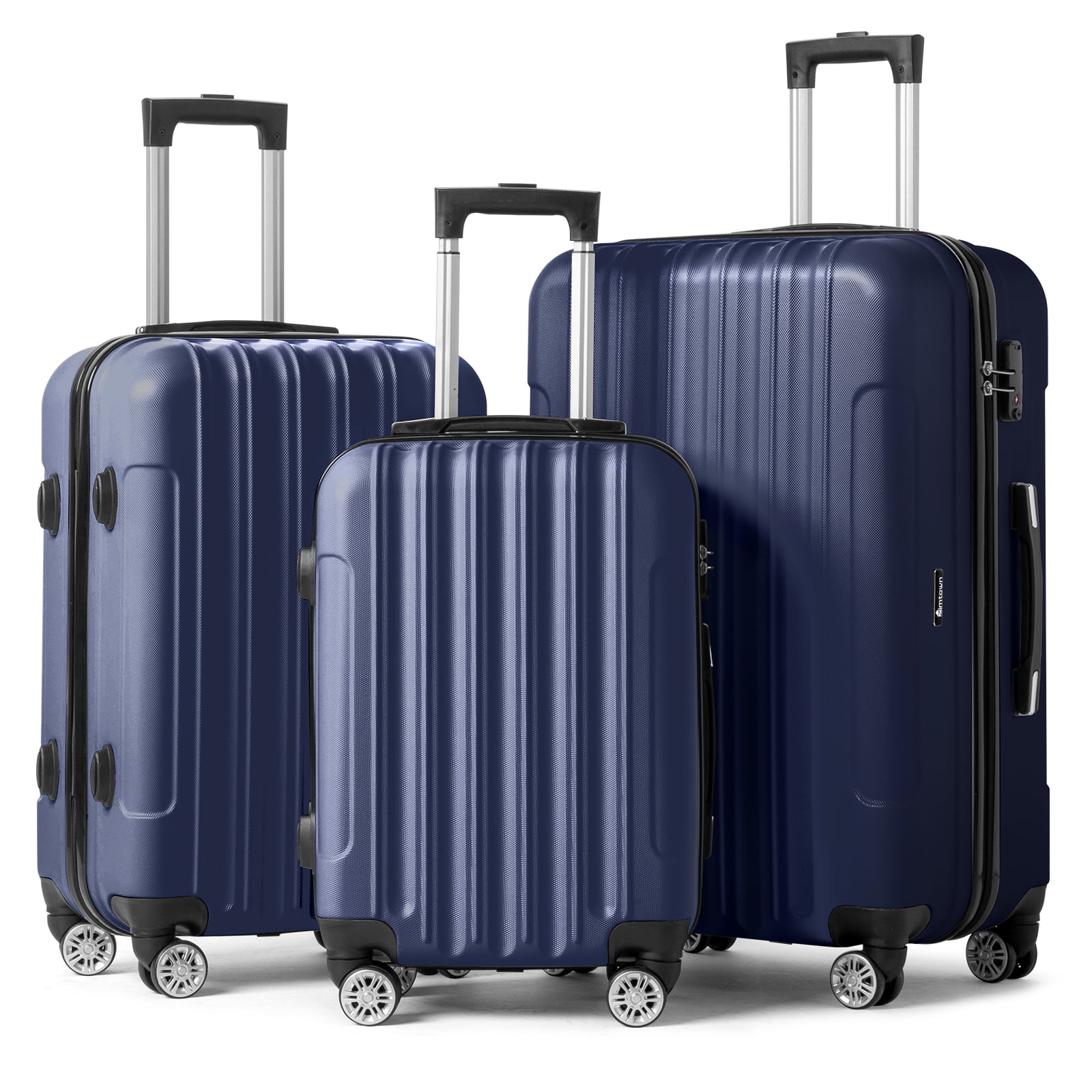'A push against Donald Trump': Why some older women are turning away from the president
Over three years into his tenure in the nation's highest office and five months before the country weighs in on his re-election, President Donald Trump’s struggles with older women, an important voting bloc for November, appear more acute in the middle of twin crises.
In 2016, Trump tilted the election in his favor after narrowly winning a handful of battleground states, and partly by performing well among white women - and older voters - even against the first-ever female nominee. Four years ago, although Hillary Clinton won women overall by a 13-point margin, Trump only lost women over 45 by 3 points (47%-50%), and won over both white women and voters over 45 with 52%, according to national exit poll data.
But this cycle, Trump is not only trailing Biden nationally by 10 points among registered voters in a new ABC News/Washington Post poll released earlier this week, he’s also seeing waning support among women over 45. Biden is now leading Trump among this group by 17 points, compared to 9 in March, in the latest poll.

It’s a hurdle that is emerging as the coronavirus pandemic ravages the nation’s seniors and Trump's "law and order" vision of leadership is up against its most critical test of his presidency as the country is engulfed by nationwide protests over racial injustice and police brutality.
In follow-up interviews with nearly a dozen women over 45, who span the ideological spectrum and geographic map, that participated in the ABC News/Washington Post poll, including some who formerly voted for Trump the first time around, most are turned off by his abrasive demeanor, divisive rhetoric and the tweets.
Not 'presidential'
"I voted for Trump. I did not care for Hillary. She was just not the role model I wanted for the first woman president," said Shannon Gridley, 78, from Orlando, Fla. Orlando sits along Florida’s crucial I-4 corridor in central Florida, which is often seen as a bellwether in the battleground.
A path to victory for Trump this cycle is expected to run through Florida, where older voters have an outsize role in the electoral fortunes of candidates in the state. In 2016, Trump won Florida by just over 1 percentage point.
Gridley, who said she identifies along the "moderate avenue," has been voting since the 1960s, starting with President John F. Kennedy. She is currently a registered Democrat and is voting for Biden in the fall, but has historically voted for Republicans far more, she said.
Behind her 2016 decision, as she put it, was the notion that as an outsider, Trump might "shake things up."
"Well, by god, he has shook things up, that is for absolutely sure," she said. "He disappointed me pretty soon. I didn't like the way he talked. I didn't think he was professional. I did not think he was presidential. I just haven't agreed with much of anything that he's done."
Another female voter, Donna, who declined to share her last name, from Springfield, Mass., which sits in the western portion of the state, told ABC News she’s voted Republican in the last two presidential elections, saying of 2016, "I was not happy four years ago with either of the candidates, but Hillary Clinton was the worst of the two."
"I voted for Donald Trump and hoped that he would rise to the occasion," she said. "Obviously, he hasn't. He is a petulant, junior high mentality candidate, and I feel that our country can do far better than that."
She is now backing Biden in November, she told ABC News.
Elizabeth Vath, too, voted for Trump in 2016. But the 75-year old Republican from Glen Mills, Pa., is siding with Biden, she said, "because of the fact that I didn't see Trump do what he promised to do. I voted for Trump because I thought he was going to do something better for our country."
"He’s lying," she continued. "He doesn’t keep his promises. He curses and he swears and the language just turns me off. I’m sorry, but I was never brought up that way."
Pennsylvania was one of the three key battlegrounds that put Trump over the top last cycle, where he defeated Clinton by the slimmest of margins - 0.7 percentage points. It is also home to a majority female population, and one that also skews older than the country, according to data from the U.S. Census Bureau compiled by the Pennsylvania State Data Center at Penn State Harrisburg.
Even a supporter of the president, who is voting for him in November, said she is repelled by what she sees as his immaturities and offensive language.
"I personally cannot listen to him on TV. There are a lot of times I would like to smack him and say, you know, your mother should have taught you better than to talk like that," Suzanne Sloane, 53, from Kalamazoo County, Mich., told ABC News in a follow-up interview. "I cringe ... I want a person who can stand up and support our values and support our country without getting down to a five-year-olds’ level of name-calling."

The Trump campaign did not respond to ABC News’ multiple requests for details about their strategy to bring this key demographic into the fold for the upcoming election.
Last year, the Trump campaign made its first major push for its "Women for Trump" coalition in August with a string of cross-country events to mobilize suburban women in key battleground states like Michigan, Pennsylvania and Ohio. The campaign launched the coalition focused on courting the women vote in July 2019.
Suburban women, in particular, represent a key voting demographic that was once the bedrock of the GOP but has been shifting away from the party in the Trump era.
In the 2018 midterms, when Democrats picked up 40 seats and the House majority, women accounted for 53% of voters, voting for Democratic House candidates by 60-39%. In 2019, in statewide and local contests in Virginia, Kentucky, Iowa and Pennsylvania, Republicans saw an erosion of support among suburban voters - and women in particular - allowing Democrats to overcome the allure of Trumpism. And the results were costly for Republicans.
This opposition could continue into 2020, and would be particularly damaging in battlegrounds across the electoral map, where a small shift in support could sway a state.
Trump’s troubles compounded by a nation in crisis
With dual crises now at the forefront of Trump's presidency, most of the women over the age of 45 that ABC News spoke with in follow-up interviews view the unfolding events as ripely exposing the unsettling and disqualifying aspects of Trump.
"His whole way to address the COVID-19 has been, excuse me, a s--- show," Donna said.
"Trump has been doing a rotten job with health care as well as with the epidemic. We can only pray and hope and vote," Vath said.
Pamela Cooper, 62, from Kannapolis, N.C., which sits in the suburbs of Charlotte, is supporting Biden in the general election, after having voted Republican up until Trump, because she said, "I think that he is definitely promoting racism."
"The pandemic is scary enough without the rioting," she said. "The only way to fight all of this is with love and understanding and compassion...violence against violence never works. These are just scary, scary times and we need a new leader."
Lynda, a voter who decided not to give her last name, from Kent County, Mich., which covers Grand Rapids and its suburbs and sided with Trump by a three-point margin in 2016, said she is "not impressed with Trump. I’ve got bitter feelings towards Trump. I’m not happy with the way he has dealt with his power and neglected the American people."
He is sowing division, she said, at a time when the country is looking for comfort and solidarity.
"He's supposed to be uniting everybody, not dividing everybody. He is supposed to be taking care of us," she said. "I think Trump should be more focused on the White House, the American people and leave Twitter alone."
A rejection of Trump, in their words
But the election still all comes down to Trump.
For the most part, the interviews with these women revealed that many see the contest as a referendum on his administration and his leadership, with most saying their decision is fueled by, as Donna said, "a push against Donald Trump," rather than a pull towards Biden.
"If Biden is the only Democrat, I will vote for Biden," Lynda said. "I wish I had another option but I don't at the moment."

"There's nothing in particular about Biden," said Sarah Schrock, a self-identified independent that is currently registered as a Democrat to vote this year, from Lucas County, Ohio. "He’s the lesser of two evils."
"I’d rather vote against Trump than sit out," she added.
One voter from Pima County, Ariz., Ruby, who refused to give her last name, casted her choice to pick Biden as binary, saying there is "only one reason" before adding, "I’m voting against Trump." She does not identify with either party.
Rorie Baker, 70, from Orange County, Calif., which was a GOP stronghold in blue California until 2018, is casting her ballot for Biden since "he’s the absolute opposite of Trump. Trump is an unbelievably incompetent man. He has no couth, no class."
But regardless of the outcome of the election, some of the women are deeply frustrated by the stark partisanship and discord rippling through the country.
"I'm more of a moderate," Sloane, the Trump-backer, said, "and I get left out."
"I just wish we had better choices," she lamented of 2020, before returning to 2016. "I'm frustrated that when the Republicans had 20 people to put out there, you had 20 people and no choice."
ABC News' Will Steakin contributed reporting.





